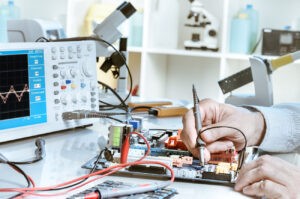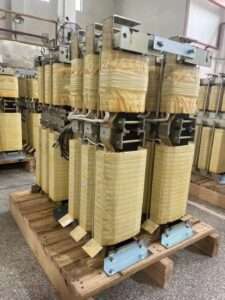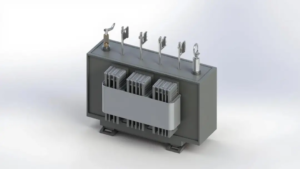Build your own solar power system
A Clean and Sustainable Energy Solution
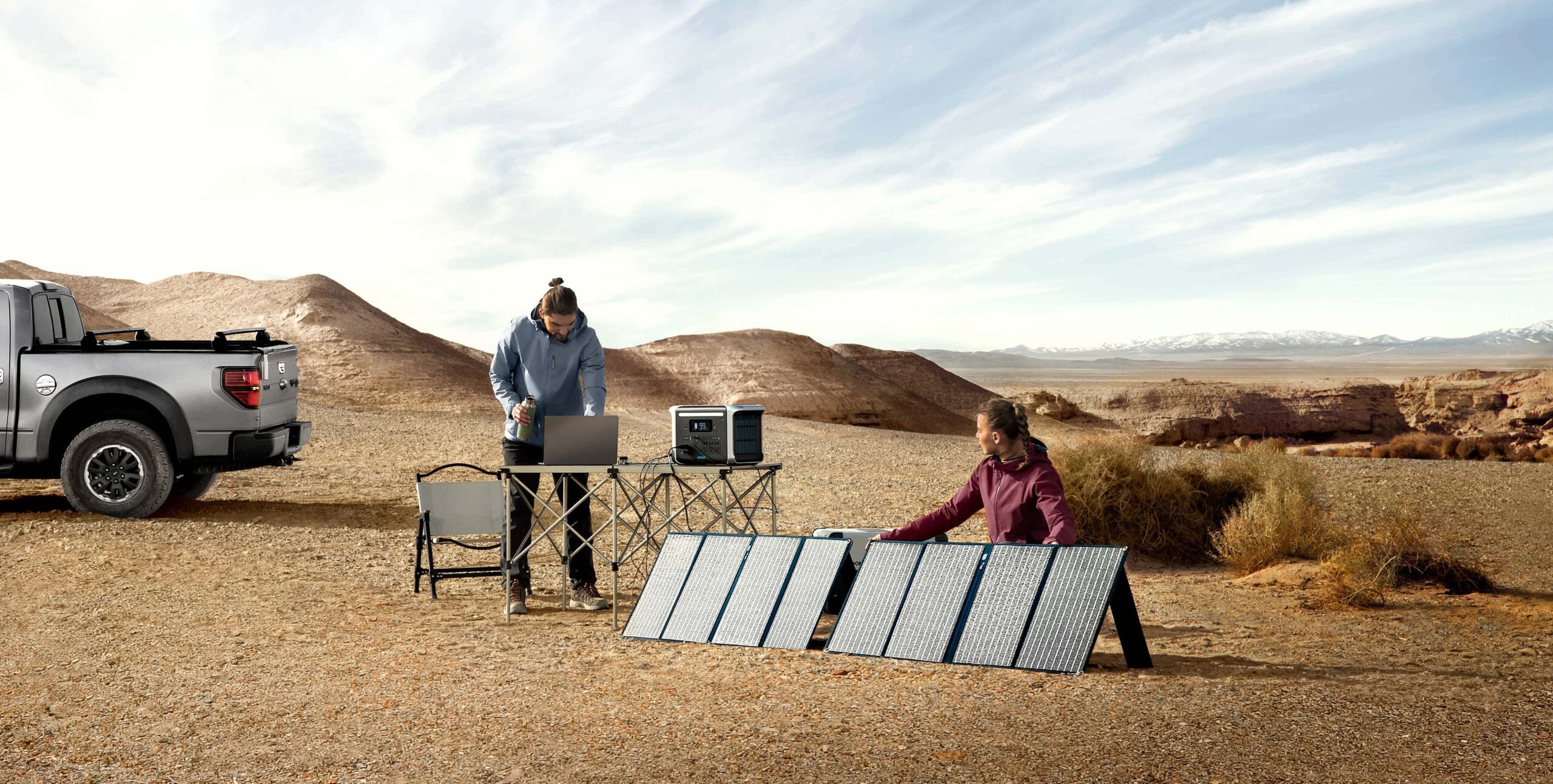
As the world looks for ways to reduce its dependence on fossil fuels, solar power systems are emerging as a clean and sustainable energy solution. Solar power systems harness the energy from the sun and convert it into usable electricity, providing a renewable source of energy for homes, businesses, and other buildings.
What is Solar Power system?
A solar power system is a type of renewable energy system that converts sunlight into usable electricity. It typically consists of solar panels, an inverter, a battery bank, and a charge controller.
Solar panels, which are made up of photovoltaic (PV) cells, are the main component of a solar power system. These cells capture the energy from the sun and convert it into direct current (DC) electricity. An inverter then converts the DC electricity into alternating current (AC) electricity, which can be used to power household appliances and other devices.
A charge controller regulates the flow of electricity from the solar panels to the battery bank. This helps to prevent overcharging and extends the life of the batteries. The battery bank stores excess electricity generated by the solar panels for use when the sun is not shining, such as at night or during cloudy weather.
Solar power systems can be installed in homes, businesses, and other buildings to provide clean and renewable energy. They are often used as a supplement to traditional grid-connected electricity or as a standalone system for off-grid locations.
There are two main types of solar power systems: grid-connected and off-grid. Grid-connected systems are the most common type of solar power system, and they are designed to work with the local electrical grid. In a grid-connected system, excess electricity generated by the solar panels is sent back to the grid, and homeowners can receive credits for the electricity they generate.
Off-grid systems, on the other hand, are not connected to the electrical grid. These systems are typically used in remote locations, such as cabins or RVs, where it is not practical to connect to the grid. Off-grid solar power systems require a battery bank to store excess electricity for use when the sun is not shining.
There are many benefits to using solar power systems. Here are a few:
Cost savings: Solar power systems can help homeowners save money on their electricity bills by generating their own electricity.
Energy independence: Solar power systems can provide homeowners with energy independence, allowing them to generate their own electricity and reduce their dependence on the electrical grid.
Reduced carbon footprint: Solar power systems produce clean, renewable energy, which helps to reduce carbon emissions and mitigate the effects of climate change.
Long lifespan: Solar power systems have a long lifespan and require little maintenance, making them a cost-effective investment for homeowners.
Can I build a solar power system in my house?
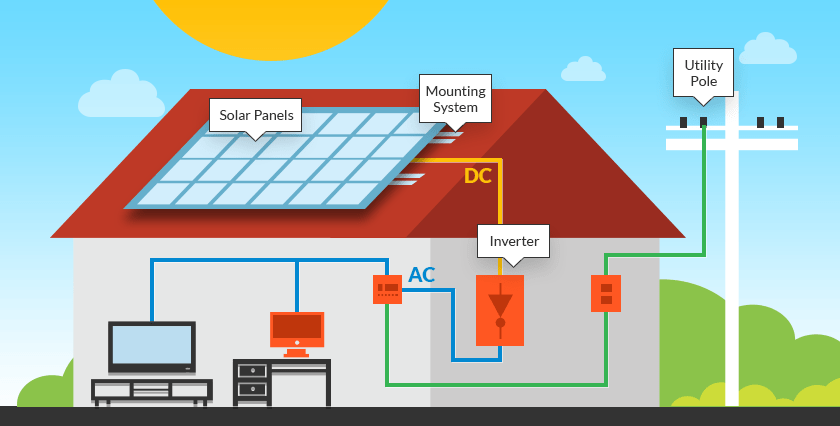
Yes, it is possible to build a solar power system in your house. However, it will depend on a few factors, such as the size of your roof, the amount of sunlight your location receives, and your budget.
Here are the basic steps to building a solar power system in your house:
- Assess your energy needs: Determine how much electricity you use on a daily, weekly, and monthly basis. This will help you calculate the size of the solar power system you need to build.
- Evaluate your roof: Check if your roof is suitable for installing solar panels. The roof should have enough space to accommodate the solar panels, and it should be sturdy enough to support the weight of the panels.
- Find a solar installer: Look for a reputable solar installer in your area who can help you design and install the solar power system.
- Choose the solar panels: Select the solar panels that will best suit your energy needs and budget. There are several types of solar panels available, and the choice will depend on factors such as efficiency, durability, and cost.
- Install the solar power system: The solar installer will install the solar panels, inverter, and other necessary components to connect the solar power system to your home’s electrical system.
- Connect to the grid: If you choose to remain connected to the grid, the solar installer will connect your solar power system to the electrical grid.
Building a solar power system can be a complex process, and it is important to work with a qualified and experienced solar installer to ensure the system is safe, reliable, and effective.
Can I build a solar power system for my electric car?
Yes, you can build a solar power system to charge your electric car. In fact, many electric vehicle (EV) owners install solar panels at their homes to generate clean, renewable energy to charge their cars.
Here are the basic steps to building a solar power system for your electric car:
Assess your energy needs: Determine how much energy your electric car requires for a full charge. This will help you calculate the size of the solar power system you need to build.
Evaluate your roof or property: Determine if you have enough space and sunlight to generate the amount of energy you need. The solar panels should ideally be installed on a south-facing roof or ground-mounted on an open area without any shade.
Find a solar installer: Look for a reputable solar installer in your area who can help you design and install the solar power system.
Choose the solar panels: Select the solar panels that will best suit your energy needs and budget. Keep in mind that higher efficiency panels may be more expensive but can generate more power per square foot of space.
Install the solar power system: The solar installer will install the solar panels, inverter, and other necessary components to connect the solar power system to your home’s electrical system.
Connect to your EV charging station: The solar power system will generate DC electricity, which can be used to directly charge an electric car with a compatible EV charging station. You can also use a DC-to-AC inverter to convert the DC electricity to AC electricity and charge your electric car with a standard Level 2 AC charging station.
Building a solar power system to charge your electric car can help you save money on your energy bills and reduce your carbon footprint. It is important to work with a qualified and experienced solar installer to ensure the system is safe, reliable, and effective.
What should I look at when I choose the Solar Power System?
When choosing a solar power system, there are several factors to consider to ensure that you get the right system for your needs. Here are some things to look for:
Energy needs: The first thing to consider is how much energy you need to power your home or business. This will depend on the size of your home, the number of appliances and devices you have, and your daily energy consumption. You can use a solar calculator or consult with a solar installer to determine your energy needs.
Size of the solar panels: The size of the solar panels you choose will depend on your energy needs and the available space on your property. Larger panels can generate more electricity, but they may not fit on smaller rooftops or properties with limited space.
Type of solar panels: There are different types of solar panels available, including monocrystalline, polycrystalline, and thin-film. Each type has its own advantages and disadvantages, so it’s important to research the options and choose the type that best suits your needs.
Inverter: The inverter is an important component of the solar power system, as it converts the DC electricity generated by the solar panels into usable AC electricity. Make sure to choose an inverter that is compatible with your solar panels and energy needs.
Warranty: Solar power systems typically come with warranties for the panels, inverters, and other components. Make sure to read the warranty carefully and choose a system with a warranty that covers at least 25 years, as this is the typical lifespan of a solar power system.
Installation and maintenance: Solar power systems require professional installation and ongoing maintenance to ensure they continue to function properly. Choose a reputable solar installer with experience installing systems similar to yours, and make sure to budget for ongoing maintenance costs.
By considering these factors, you can choose a solar power system that meets your energy needs, fits your property, and provides reliable and renewable energy for years to come.
Step to build your own solar power system?
When choosing a solar power system, there are several factors to consider to ensure that you get the right system for your needs. Here are some things to look for:
Energy needs: The first thing to consider is how much energy you need to power your home or business. This will depend on the size of your home, the number of appliances and devices you have, and your daily energy consumption. You can use a solar calculator or consult with a solar installer to determine your energy needs.
Size of the solar panels: The size of the solar panels you choose will depend on your energy needs and the available space on your property. Larger panels can generate more electricity, but they may not fit on smaller rooftops or properties with limited space.
Type of solar panels: There are different types of solar panels available, including monocrystalline, polycrystalline, and thin-film. Each type has its own advantages and disadvantages, so it’s important to research the options and choose the type that best suits your needs.
Inverter: The inverter is an important component of the solar power system, as it converts the DC electricity generated by the solar panels into usable AC electricity. Make sure to choose an inverter that is compatible with your solar panels and energy needs.
Warranty: Solar power systems typically come with warranties for the panels, inverters, and other components. Make sure to read the warranty carefully and choose a system with a warranty that covers at least 25 years, as this is the typical lifespan of a solar power system.
Installation and maintenance: Solar power systems require professional installation and ongoing maintenance to ensure they continue to function properly. Choose a reputable solar installer with experience installing systems similar to yours, and make sure to budget for ongoing maintenance costs.
By considering these factors, you can choose a solar power system that meets your energy needs, fits your property, and provides reliable and renewable energy for years to come.

